Analysis of Entrepreneurship and Small Business Management
VerifiedAdded on 2023/06/18
|17
|3742
|396
Report
AI Summary
This report provides a comprehensive analysis of entrepreneurship and small business management, exploring different types of entrepreneurial ventures and their relationship to the typology of entrepreneurship. It examines the similarities and differences between these ventures, assesses their impact on the UK economy through relevant data and statistics, and explains the importance of small businesses and start-ups to the growth of the social economy. Furthermore, the report delves into the characteristic traits and skills of successful entrepreneurs, differentiating them from business managers, and reflects on how entrepreneurial personalities, motivation, mindset, background, and experience can either hinder or foster entrepreneurship, offering a holistic view of the entrepreneurial landscape.
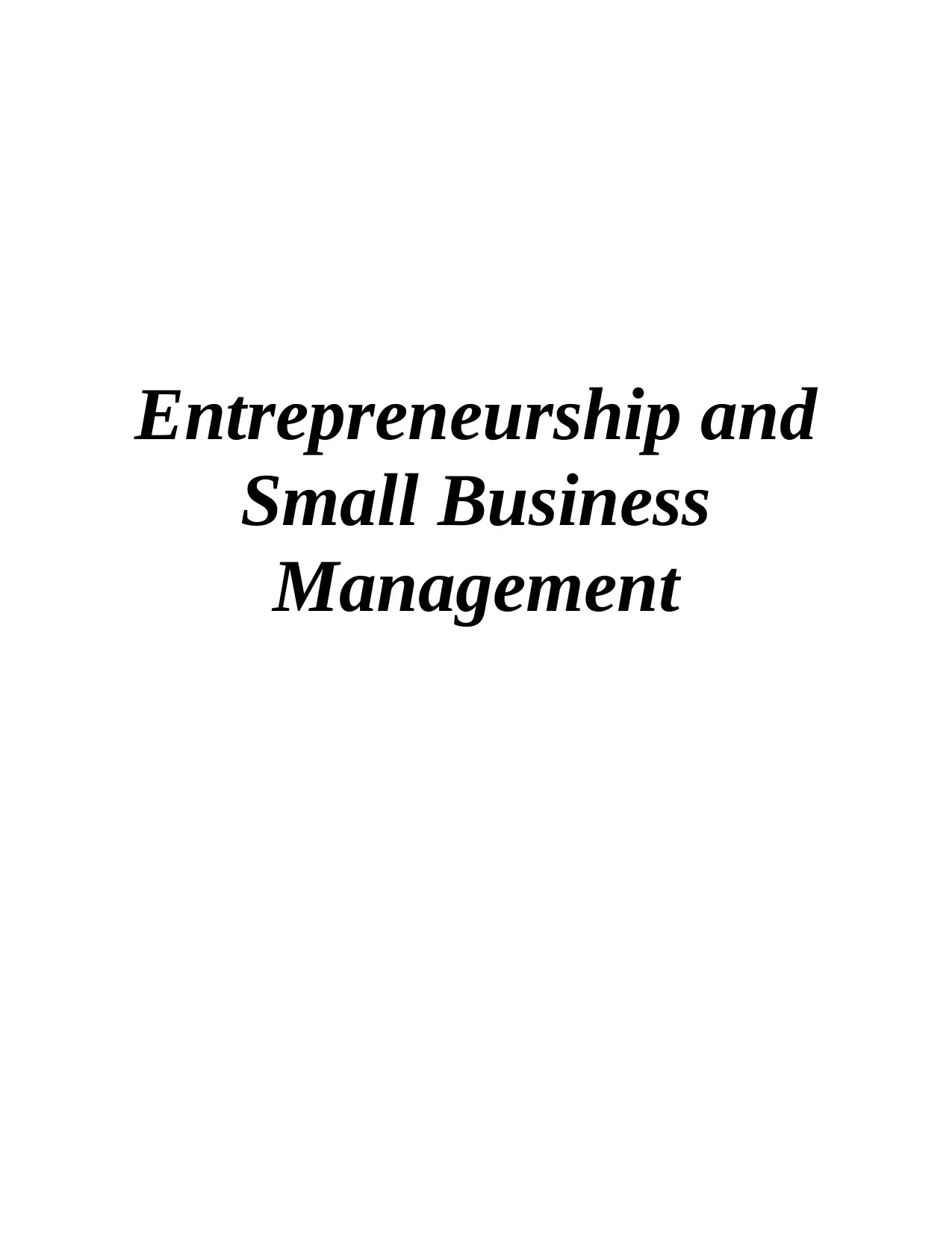
Entrepreneurship and
Small Business
Management
Small Business
Management
Paraphrase This Document
Need a fresh take? Get an instant paraphrase of this document with our AI Paraphraser
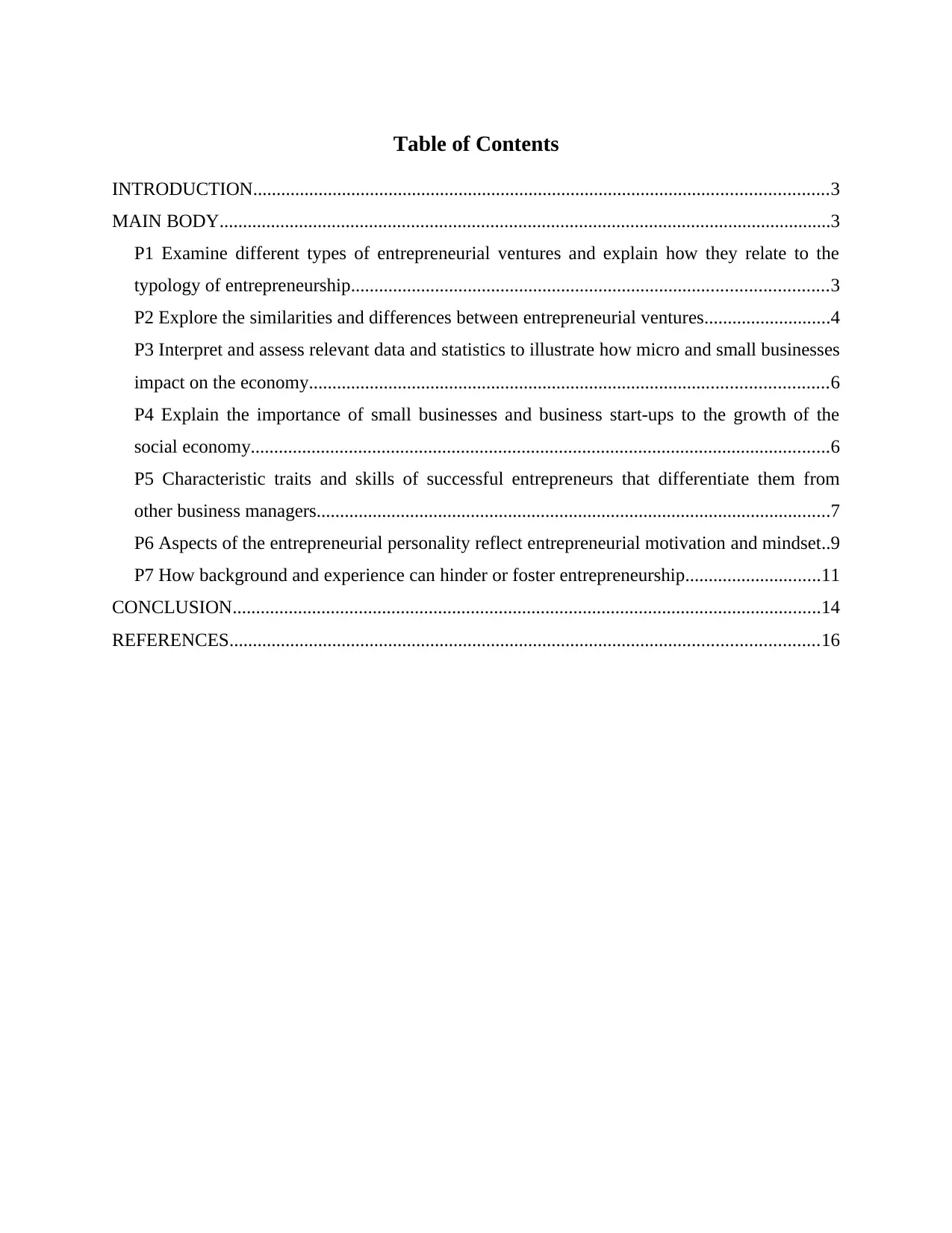
Table of Contents
INTRODUCTION...........................................................................................................................3
MAIN BODY...................................................................................................................................3
P1 Examine different types of entrepreneurial ventures and explain how they relate to the
typology of entrepreneurship......................................................................................................3
P2 Explore the similarities and differences between entrepreneurial ventures...........................4
P3 Interpret and assess relevant data and statistics to illustrate how micro and small businesses
impact on the economy...............................................................................................................6
P4 Explain the importance of small businesses and business start-ups to the growth of the
social economy............................................................................................................................6
P5 Characteristic traits and skills of successful entrepreneurs that differentiate them from
other business managers..............................................................................................................7
P6 Aspects of the entrepreneurial personality reflect entrepreneurial motivation and mindset..9
P7 How background and experience can hinder or foster entrepreneurship.............................11
CONCLUSION..............................................................................................................................14
REFERENCES..............................................................................................................................16
INTRODUCTION...........................................................................................................................3
MAIN BODY...................................................................................................................................3
P1 Examine different types of entrepreneurial ventures and explain how they relate to the
typology of entrepreneurship......................................................................................................3
P2 Explore the similarities and differences between entrepreneurial ventures...........................4
P3 Interpret and assess relevant data and statistics to illustrate how micro and small businesses
impact on the economy...............................................................................................................6
P4 Explain the importance of small businesses and business start-ups to the growth of the
social economy............................................................................................................................6
P5 Characteristic traits and skills of successful entrepreneurs that differentiate them from
other business managers..............................................................................................................7
P6 Aspects of the entrepreneurial personality reflect entrepreneurial motivation and mindset..9
P7 How background and experience can hinder or foster entrepreneurship.............................11
CONCLUSION..............................................................................................................................14
REFERENCES..............................................................................................................................16
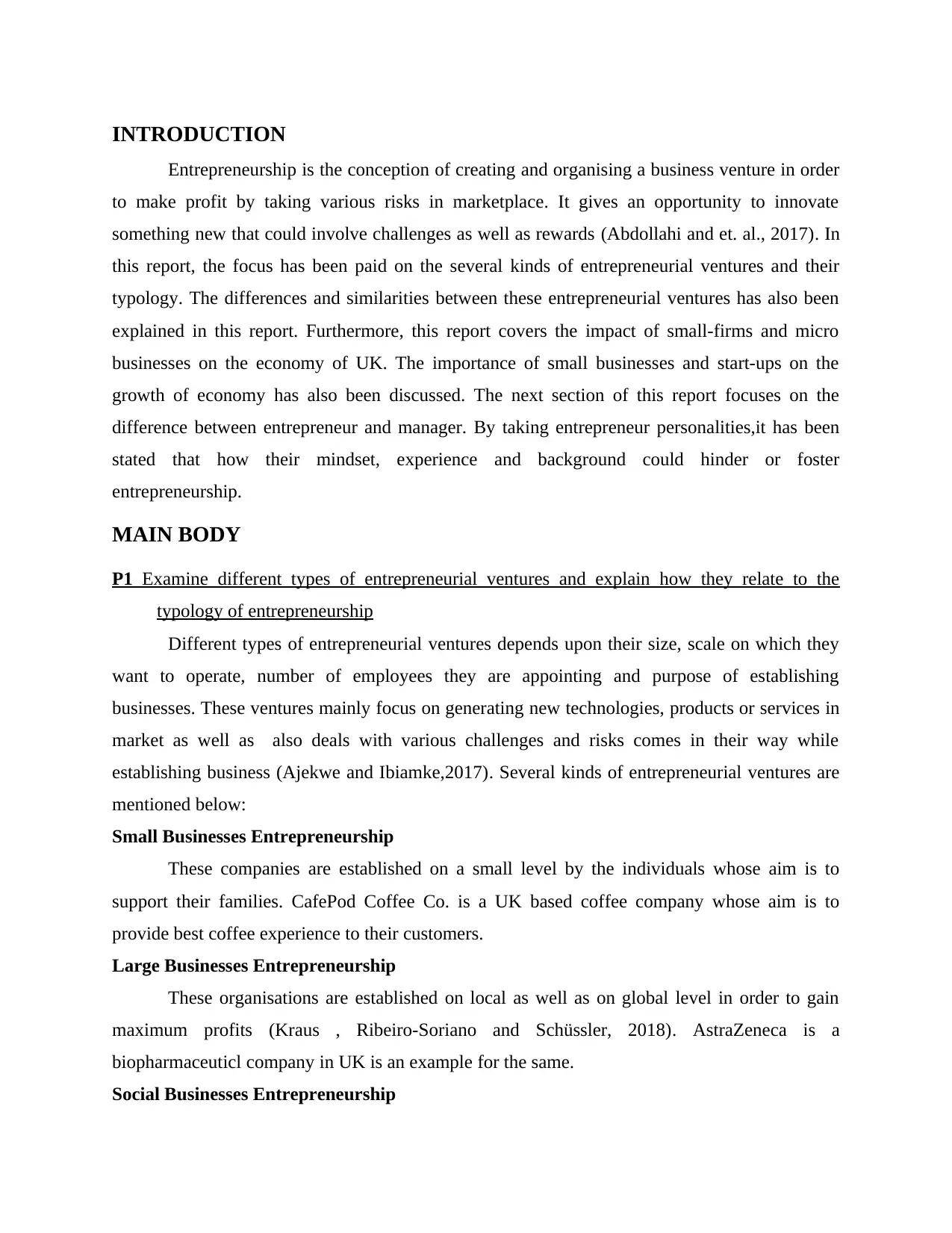
INTRODUCTION
Entrepreneurship is the conception of creating and organising a business venture in order
to make profit by taking various risks in marketplace. It gives an opportunity to innovate
something new that could involve challenges as well as rewards (Abdollahi and et. al., 2017). In
this report, the focus has been paid on the several kinds of entrepreneurial ventures and their
typology. The differences and similarities between these entrepreneurial ventures has also been
explained in this report. Furthermore, this report covers the impact of small-firms and micro
businesses on the economy of UK. The importance of small businesses and start-ups on the
growth of economy has also been discussed. The next section of this report focuses on the
difference between entrepreneur and manager. By taking entrepreneur personalities,it has been
stated that how their mindset, experience and background could hinder or foster
entrepreneurship.
MAIN BODY
P1 Examine different types of entrepreneurial ventures and explain how they relate to the
typology of entrepreneurship
Different types of entrepreneurial ventures depends upon their size, scale on which they
want to operate, number of employees they are appointing and purpose of establishing
businesses. These ventures mainly focus on generating new technologies, products or services in
market as well as also deals with various challenges and risks comes in their way while
establishing business (Ajekwe and Ibiamke,2017). Several kinds of entrepreneurial ventures are
mentioned below:
Small Businesses Entrepreneurship
These companies are established on a small level by the individuals whose aim is to
support their families. CafePod Coffee Co. is a UK based coffee company whose aim is to
provide best coffee experience to their customers.
Large Businesses Entrepreneurship
These organisations are established on local as well as on global level in order to gain
maximum profits (Kraus , Ribeiro-Soriano and Schüssler, 2018). AstraZeneca is a
biopharmaceuticl company in UK is an example for the same.
Social Businesses Entrepreneurship
Entrepreneurship is the conception of creating and organising a business venture in order
to make profit by taking various risks in marketplace. It gives an opportunity to innovate
something new that could involve challenges as well as rewards (Abdollahi and et. al., 2017). In
this report, the focus has been paid on the several kinds of entrepreneurial ventures and their
typology. The differences and similarities between these entrepreneurial ventures has also been
explained in this report. Furthermore, this report covers the impact of small-firms and micro
businesses on the economy of UK. The importance of small businesses and start-ups on the
growth of economy has also been discussed. The next section of this report focuses on the
difference between entrepreneur and manager. By taking entrepreneur personalities,it has been
stated that how their mindset, experience and background could hinder or foster
entrepreneurship.
MAIN BODY
P1 Examine different types of entrepreneurial ventures and explain how they relate to the
typology of entrepreneurship
Different types of entrepreneurial ventures depends upon their size, scale on which they
want to operate, number of employees they are appointing and purpose of establishing
businesses. These ventures mainly focus on generating new technologies, products or services in
market as well as also deals with various challenges and risks comes in their way while
establishing business (Ajekwe and Ibiamke,2017). Several kinds of entrepreneurial ventures are
mentioned below:
Small Businesses Entrepreneurship
These companies are established on a small level by the individuals whose aim is to
support their families. CafePod Coffee Co. is a UK based coffee company whose aim is to
provide best coffee experience to their customers.
Large Businesses Entrepreneurship
These organisations are established on local as well as on global level in order to gain
maximum profits (Kraus , Ribeiro-Soriano and Schüssler, 2018). AstraZeneca is a
biopharmaceuticl company in UK is an example for the same.
Social Businesses Entrepreneurship
⊘ This is a preview!⊘
Do you want full access?
Subscribe today to unlock all pages.

Trusted by 1+ million students worldwide
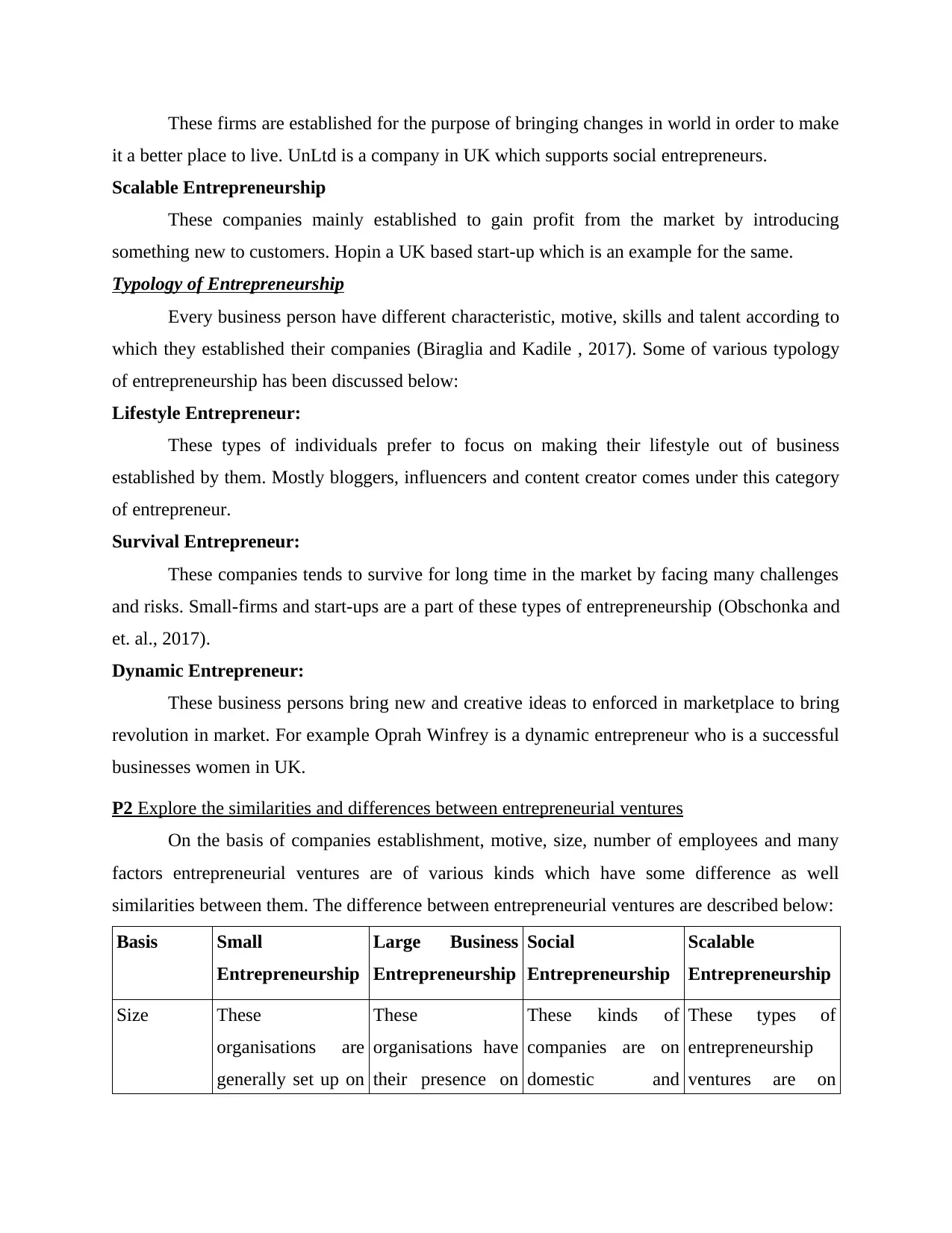
These firms are established for the purpose of bringing changes in world in order to make
it a better place to live. UnLtd is a company in UK which supports social entrepreneurs.
Scalable Entrepreneurship
These companies mainly established to gain profit from the market by introducing
something new to customers. Hopin a UK based start-up which is an example for the same.
Typology of Entrepreneurship
Every business person have different characteristic, motive, skills and talent according to
which they established their companies (Biraglia and Kadile , 2017). Some of various typology
of entrepreneurship has been discussed below:
Lifestyle Entrepreneur:
These types of individuals prefer to focus on making their lifestyle out of business
established by them. Mostly bloggers, influencers and content creator comes under this category
of entrepreneur.
Survival Entrepreneur:
These companies tends to survive for long time in the market by facing many challenges
and risks. Small-firms and start-ups are a part of these types of entrepreneurship (Obschonka and
et. al., 2017).
Dynamic Entrepreneur:
These business persons bring new and creative ideas to enforced in marketplace to bring
revolution in market. For example Oprah Winfrey is a dynamic entrepreneur who is a successful
businesses women in UK.
P2 Explore the similarities and differences between entrepreneurial ventures
On the basis of companies establishment, motive, size, number of employees and many
factors entrepreneurial ventures are of various kinds which have some difference as well
similarities between them. The difference between entrepreneurial ventures are described below:
Basis Small
Entrepreneurship
Large Business
Entrepreneurship
Social
Entrepreneurship
Scalable
Entrepreneurship
Size These
organisations are
generally set up on
These
organisations have
their presence on
These kinds of
companies are on
domestic and
These types of
entrepreneurship
ventures are on
it a better place to live. UnLtd is a company in UK which supports social entrepreneurs.
Scalable Entrepreneurship
These companies mainly established to gain profit from the market by introducing
something new to customers. Hopin a UK based start-up which is an example for the same.
Typology of Entrepreneurship
Every business person have different characteristic, motive, skills and talent according to
which they established their companies (Biraglia and Kadile , 2017). Some of various typology
of entrepreneurship has been discussed below:
Lifestyle Entrepreneur:
These types of individuals prefer to focus on making their lifestyle out of business
established by them. Mostly bloggers, influencers and content creator comes under this category
of entrepreneur.
Survival Entrepreneur:
These companies tends to survive for long time in the market by facing many challenges
and risks. Small-firms and start-ups are a part of these types of entrepreneurship (Obschonka and
et. al., 2017).
Dynamic Entrepreneur:
These business persons bring new and creative ideas to enforced in marketplace to bring
revolution in market. For example Oprah Winfrey is a dynamic entrepreneur who is a successful
businesses women in UK.
P2 Explore the similarities and differences between entrepreneurial ventures
On the basis of companies establishment, motive, size, number of employees and many
factors entrepreneurial ventures are of various kinds which have some difference as well
similarities between them. The difference between entrepreneurial ventures are described below:
Basis Small
Entrepreneurship
Large Business
Entrepreneurship
Social
Entrepreneurship
Scalable
Entrepreneurship
Size These
organisations are
generally set up on
These
organisations have
their presence on
These kinds of
companies are on
domestic and
These types of
entrepreneurship
ventures are on
Paraphrase This Document
Need a fresh take? Get an instant paraphrase of this document with our AI Paraphraser
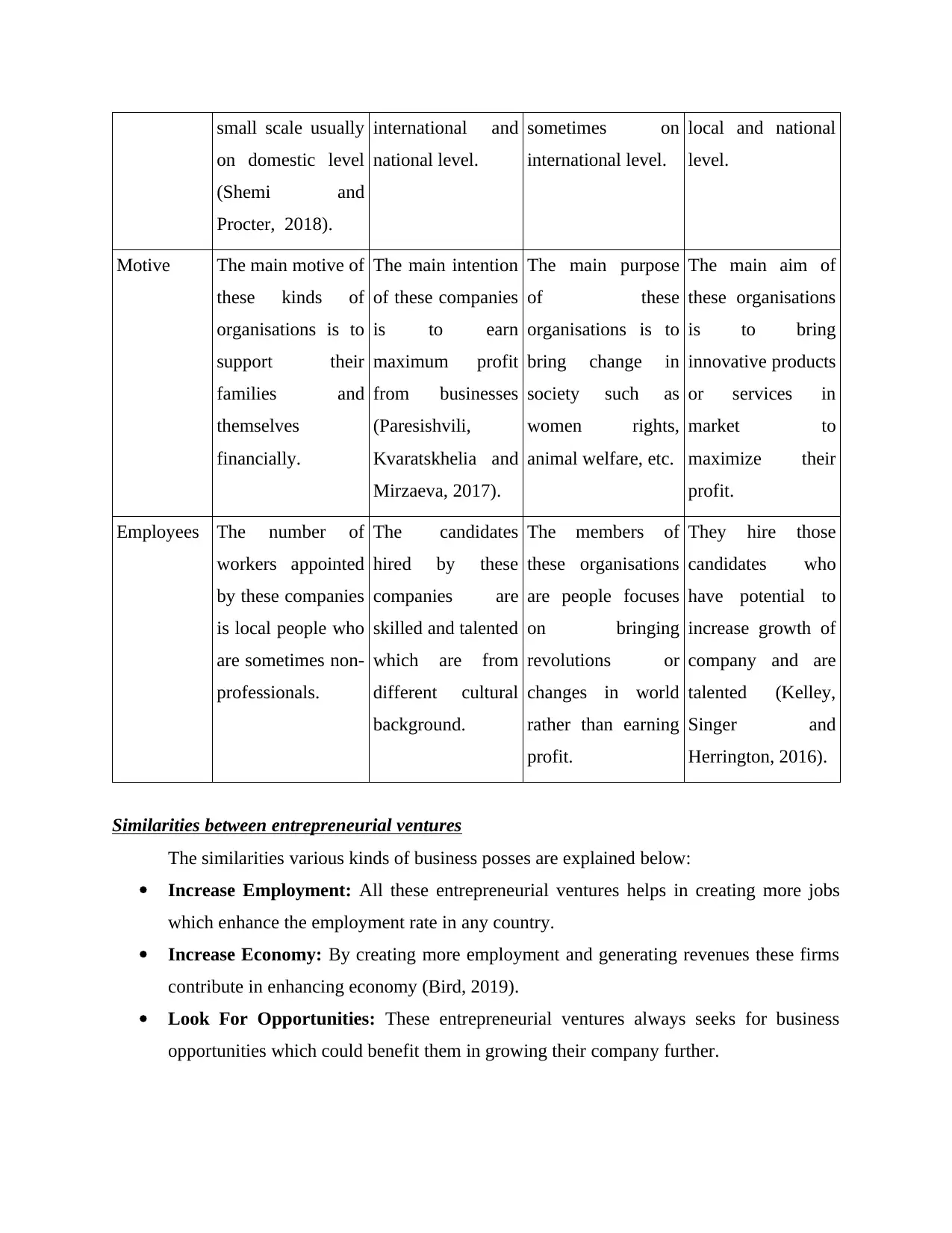
small scale usually
on domestic level
(Shemi and
Procter, 2018).
international and
national level.
sometimes on
international level.
local and national
level.
Motive The main motive of
these kinds of
organisations is to
support their
families and
themselves
financially.
The main intention
of these companies
is to earn
maximum profit
from businesses
(Paresishvili,
Kvaratskhelia and
Mirzaeva, 2017).
The main purpose
of these
organisations is to
bring change in
society such as
women rights,
animal welfare, etc.
The main aim of
these organisations
is to bring
innovative products
or services in
market to
maximize their
profit.
Employees The number of
workers appointed
by these companies
is local people who
are sometimes non-
professionals.
The candidates
hired by these
companies are
skilled and talented
which are from
different cultural
background.
The members of
these organisations
are people focuses
on bringing
revolutions or
changes in world
rather than earning
profit.
They hire those
candidates who
have potential to
increase growth of
company and are
talented (Kelley,
Singer and
Herrington, 2016).
Similarities between entrepreneurial ventures
The similarities various kinds of business posses are explained below:
Increase Employment: All these entrepreneurial ventures helps in creating more jobs
which enhance the employment rate in any country.
Increase Economy: By creating more employment and generating revenues these firms
contribute in enhancing economy (Bird, 2019).
Look For Opportunities: These entrepreneurial ventures always seeks for business
opportunities which could benefit them in growing their company further.
on domestic level
(Shemi and
Procter, 2018).
international and
national level.
sometimes on
international level.
local and national
level.
Motive The main motive of
these kinds of
organisations is to
support their
families and
themselves
financially.
The main intention
of these companies
is to earn
maximum profit
from businesses
(Paresishvili,
Kvaratskhelia and
Mirzaeva, 2017).
The main purpose
of these
organisations is to
bring change in
society such as
women rights,
animal welfare, etc.
The main aim of
these organisations
is to bring
innovative products
or services in
market to
maximize their
profit.
Employees The number of
workers appointed
by these companies
is local people who
are sometimes non-
professionals.
The candidates
hired by these
companies are
skilled and talented
which are from
different cultural
background.
The members of
these organisations
are people focuses
on bringing
revolutions or
changes in world
rather than earning
profit.
They hire those
candidates who
have potential to
increase growth of
company and are
talented (Kelley,
Singer and
Herrington, 2016).
Similarities between entrepreneurial ventures
The similarities various kinds of business posses are explained below:
Increase Employment: All these entrepreneurial ventures helps in creating more jobs
which enhance the employment rate in any country.
Increase Economy: By creating more employment and generating revenues these firms
contribute in enhancing economy (Bird, 2019).
Look For Opportunities: These entrepreneurial ventures always seeks for business
opportunities which could benefit them in growing their company further.
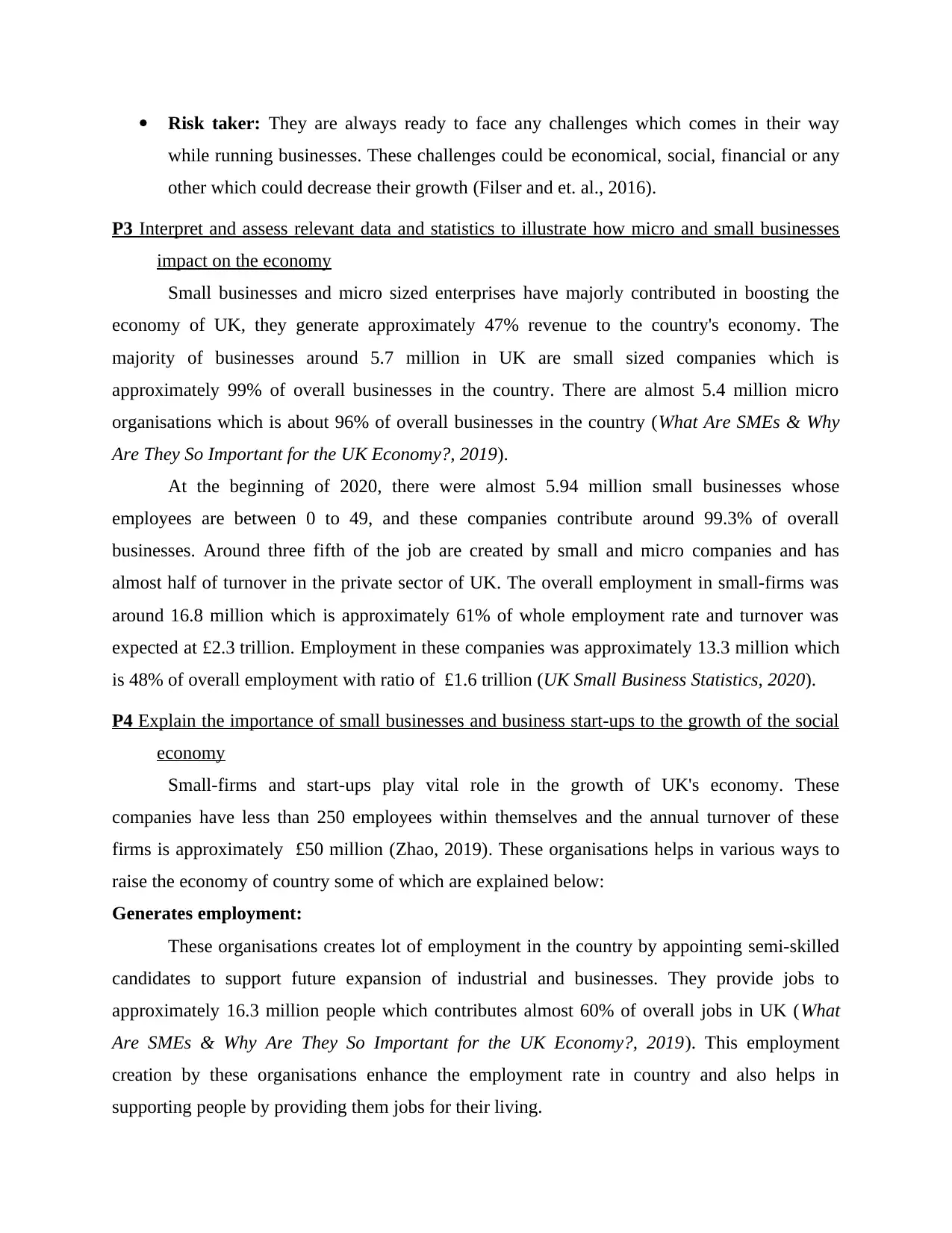
Risk taker: They are always ready to face any challenges which comes in their way
while running businesses. These challenges could be economical, social, financial or any
other which could decrease their growth (Filser and et. al., 2016).
P3 Interpret and assess relevant data and statistics to illustrate how micro and small businesses
impact on the economy
Small businesses and micro sized enterprises have majorly contributed in boosting the
economy of UK, they generate approximately 47% revenue to the country's economy. The
majority of businesses around 5.7 million in UK are small sized companies which is
approximately 99% of overall businesses in the country. There are almost 5.4 million micro
organisations which is about 96% of overall businesses in the country (What Are SMEs & Why
Are They So Important for the UK Economy?, 2019).
At the beginning of 2020, there were almost 5.94 million small businesses whose
employees are between 0 to 49, and these companies contribute around 99.3% of overall
businesses. Around three fifth of the job are created by small and micro companies and has
almost half of turnover in the private sector of UK. The overall employment in small-firms was
around 16.8 million which is approximately 61% of whole employment rate and turnover was
expected at £2.3 trillion. Employment in these companies was approximately 13.3 million which
is 48% of overall employment with ratio of £1.6 trillion (UK Small Business Statistics, 2020).
P4 Explain the importance of small businesses and business start-ups to the growth of the social
economy
Small-firms and start-ups play vital role in the growth of UK's economy. These
companies have less than 250 employees within themselves and the annual turnover of these
firms is approximately £50 million (Zhao, 2019). These organisations helps in various ways to
raise the economy of country some of which are explained below:
Generates employment:
These organisations creates lot of employment in the country by appointing semi-skilled
candidates to support future expansion of industrial and businesses. They provide jobs to
approximately 16.3 million people which contributes almost 60% of overall jobs in UK (What
Are SMEs & Why Are They So Important for the UK Economy?, 2019). This employment
creation by these organisations enhance the employment rate in country and also helps in
supporting people by providing them jobs for their living.
while running businesses. These challenges could be economical, social, financial or any
other which could decrease their growth (Filser and et. al., 2016).
P3 Interpret and assess relevant data and statistics to illustrate how micro and small businesses
impact on the economy
Small businesses and micro sized enterprises have majorly contributed in boosting the
economy of UK, they generate approximately 47% revenue to the country's economy. The
majority of businesses around 5.7 million in UK are small sized companies which is
approximately 99% of overall businesses in the country. There are almost 5.4 million micro
organisations which is about 96% of overall businesses in the country (What Are SMEs & Why
Are They So Important for the UK Economy?, 2019).
At the beginning of 2020, there were almost 5.94 million small businesses whose
employees are between 0 to 49, and these companies contribute around 99.3% of overall
businesses. Around three fifth of the job are created by small and micro companies and has
almost half of turnover in the private sector of UK. The overall employment in small-firms was
around 16.8 million which is approximately 61% of whole employment rate and turnover was
expected at £2.3 trillion. Employment in these companies was approximately 13.3 million which
is 48% of overall employment with ratio of £1.6 trillion (UK Small Business Statistics, 2020).
P4 Explain the importance of small businesses and business start-ups to the growth of the social
economy
Small-firms and start-ups play vital role in the growth of UK's economy. These
companies have less than 250 employees within themselves and the annual turnover of these
firms is approximately £50 million (Zhao, 2019). These organisations helps in various ways to
raise the economy of country some of which are explained below:
Generates employment:
These organisations creates lot of employment in the country by appointing semi-skilled
candidates to support future expansion of industrial and businesses. They provide jobs to
approximately 16.3 million people which contributes almost 60% of overall jobs in UK (What
Are SMEs & Why Are They So Important for the UK Economy?, 2019). This employment
creation by these organisations enhance the employment rate in country and also helps in
supporting people by providing them jobs for their living.
⊘ This is a preview!⊘
Do you want full access?
Subscribe today to unlock all pages.

Trusted by 1+ million students worldwide
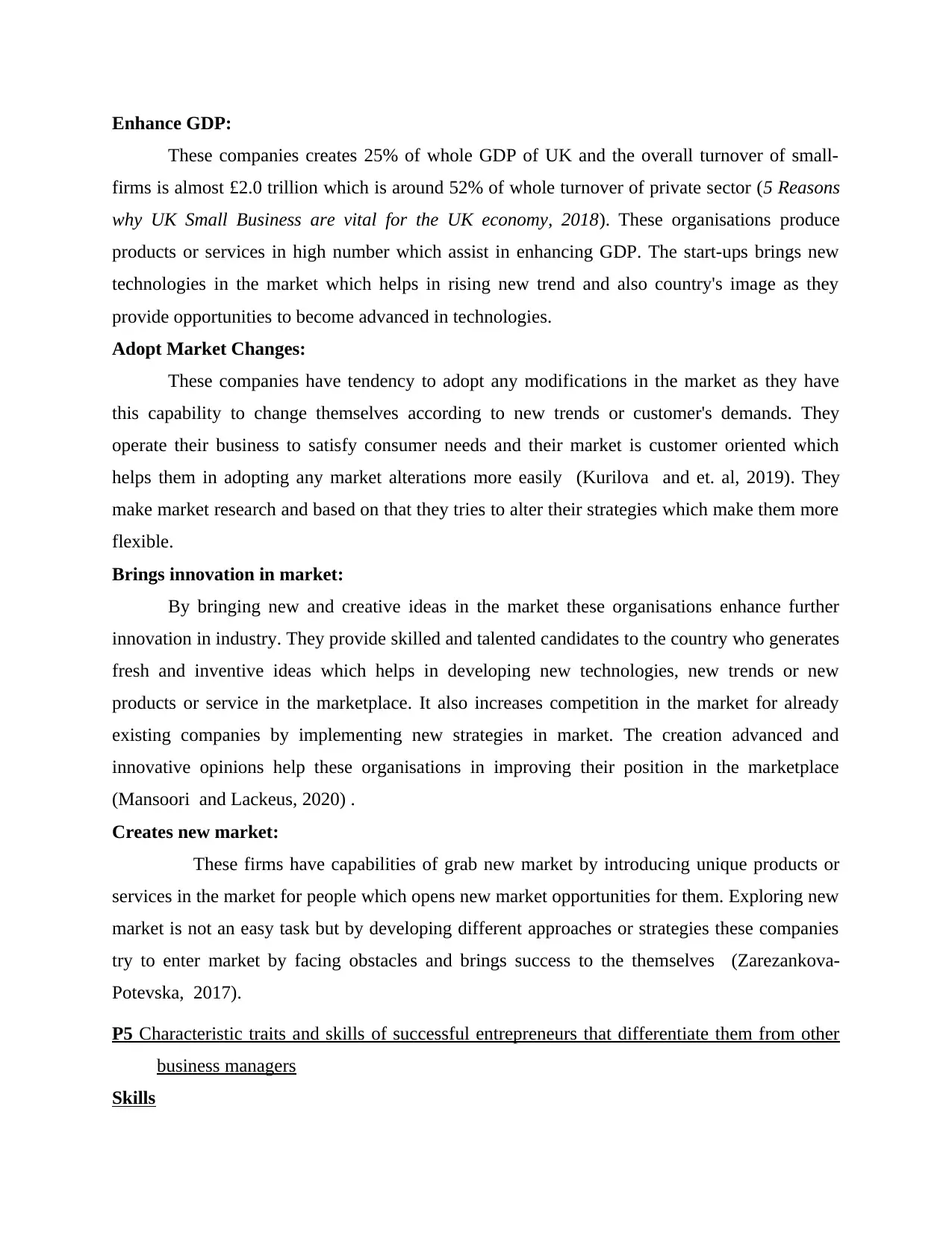
Enhance GDP:
These companies creates 25% of whole GDP of UK and the overall turnover of small-
firms is almost £2.0 trillion which is around 52% of whole turnover of private sector (5 Reasons
why UK Small Business are vital for the UK economy, 2018). These organisations produce
products or services in high number which assist in enhancing GDP. The start-ups brings new
technologies in the market which helps in rising new trend and also country's image as they
provide opportunities to become advanced in technologies.
Adopt Market Changes:
These companies have tendency to adopt any modifications in the market as they have
this capability to change themselves according to new trends or customer's demands. They
operate their business to satisfy consumer needs and their market is customer oriented which
helps them in adopting any market alterations more easily (Kurilova and et. al, 2019). They
make market research and based on that they tries to alter their strategies which make them more
flexible.
Brings innovation in market:
By bringing new and creative ideas in the market these organisations enhance further
innovation in industry. They provide skilled and talented candidates to the country who generates
fresh and inventive ideas which helps in developing new technologies, new trends or new
products or service in the marketplace. It also increases competition in the market for already
existing companies by implementing new strategies in market. The creation advanced and
innovative opinions help these organisations in improving their position in the marketplace
(Mansoori and Lackeus, 2020) .
Creates new market:
These firms have capabilities of grab new market by introducing unique products or
services in the market for people which opens new market opportunities for them. Exploring new
market is not an easy task but by developing different approaches or strategies these companies
try to enter market by facing obstacles and brings success to the themselves (Zarezankova-
Potevska, 2017).
P5 Characteristic traits and skills of successful entrepreneurs that differentiate them from other
business managers
Skills
These companies creates 25% of whole GDP of UK and the overall turnover of small-
firms is almost £2.0 trillion which is around 52% of whole turnover of private sector (5 Reasons
why UK Small Business are vital for the UK economy, 2018). These organisations produce
products or services in high number which assist in enhancing GDP. The start-ups brings new
technologies in the market which helps in rising new trend and also country's image as they
provide opportunities to become advanced in technologies.
Adopt Market Changes:
These companies have tendency to adopt any modifications in the market as they have
this capability to change themselves according to new trends or customer's demands. They
operate their business to satisfy consumer needs and their market is customer oriented which
helps them in adopting any market alterations more easily (Kurilova and et. al, 2019). They
make market research and based on that they tries to alter their strategies which make them more
flexible.
Brings innovation in market:
By bringing new and creative ideas in the market these organisations enhance further
innovation in industry. They provide skilled and talented candidates to the country who generates
fresh and inventive ideas which helps in developing new technologies, new trends or new
products or service in the marketplace. It also increases competition in the market for already
existing companies by implementing new strategies in market. The creation advanced and
innovative opinions help these organisations in improving their position in the marketplace
(Mansoori and Lackeus, 2020) .
Creates new market:
These firms have capabilities of grab new market by introducing unique products or
services in the market for people which opens new market opportunities for them. Exploring new
market is not an easy task but by developing different approaches or strategies these companies
try to enter market by facing obstacles and brings success to the themselves (Zarezankova-
Potevska, 2017).
P5 Characteristic traits and skills of successful entrepreneurs that differentiate them from other
business managers
Skills
Paraphrase This Document
Need a fresh take? Get an instant paraphrase of this document with our AI Paraphraser
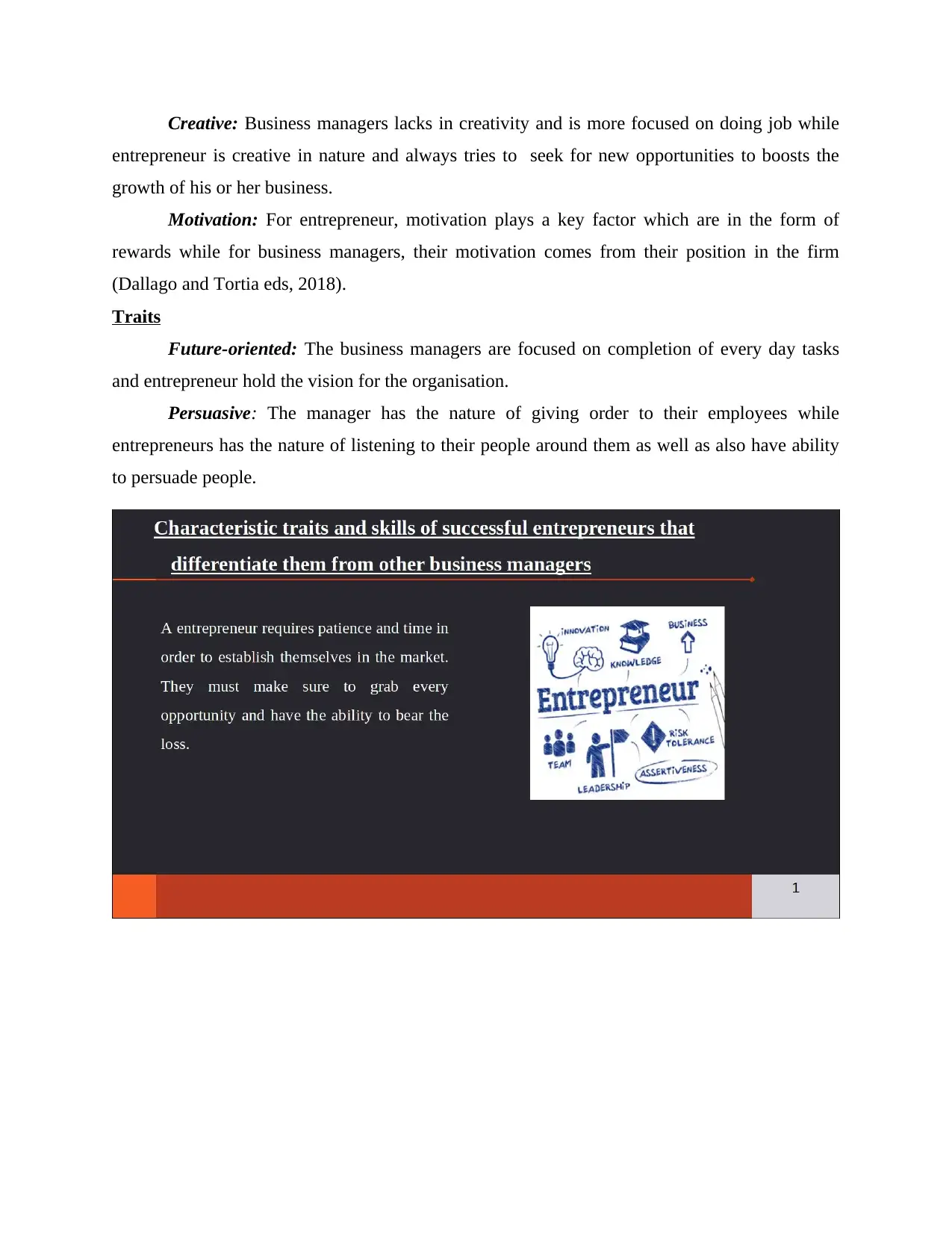
Creative: Business managers lacks in creativity and is more focused on doing job while
entrepreneur is creative in nature and always tries to seek for new opportunities to boosts the
growth of his or her business.
Motivation: For entrepreneur, motivation plays a key factor which are in the form of
rewards while for business managers, their motivation comes from their position in the firm
(Dallago and Tortia eds, 2018).
Traits
Future-oriented: The business managers are focused on completion of every day tasks
and entrepreneur hold the vision for the organisation.
Persuasive: The manager has the nature of giving order to their employees while
entrepreneurs has the nature of listening to their people around them as well as also have ability
to persuade people.
entrepreneur is creative in nature and always tries to seek for new opportunities to boosts the
growth of his or her business.
Motivation: For entrepreneur, motivation plays a key factor which are in the form of
rewards while for business managers, their motivation comes from their position in the firm
(Dallago and Tortia eds, 2018).
Traits
Future-oriented: The business managers are focused on completion of every day tasks
and entrepreneur hold the vision for the organisation.
Persuasive: The manager has the nature of giving order to their employees while
entrepreneurs has the nature of listening to their people around them as well as also have ability
to persuade people.
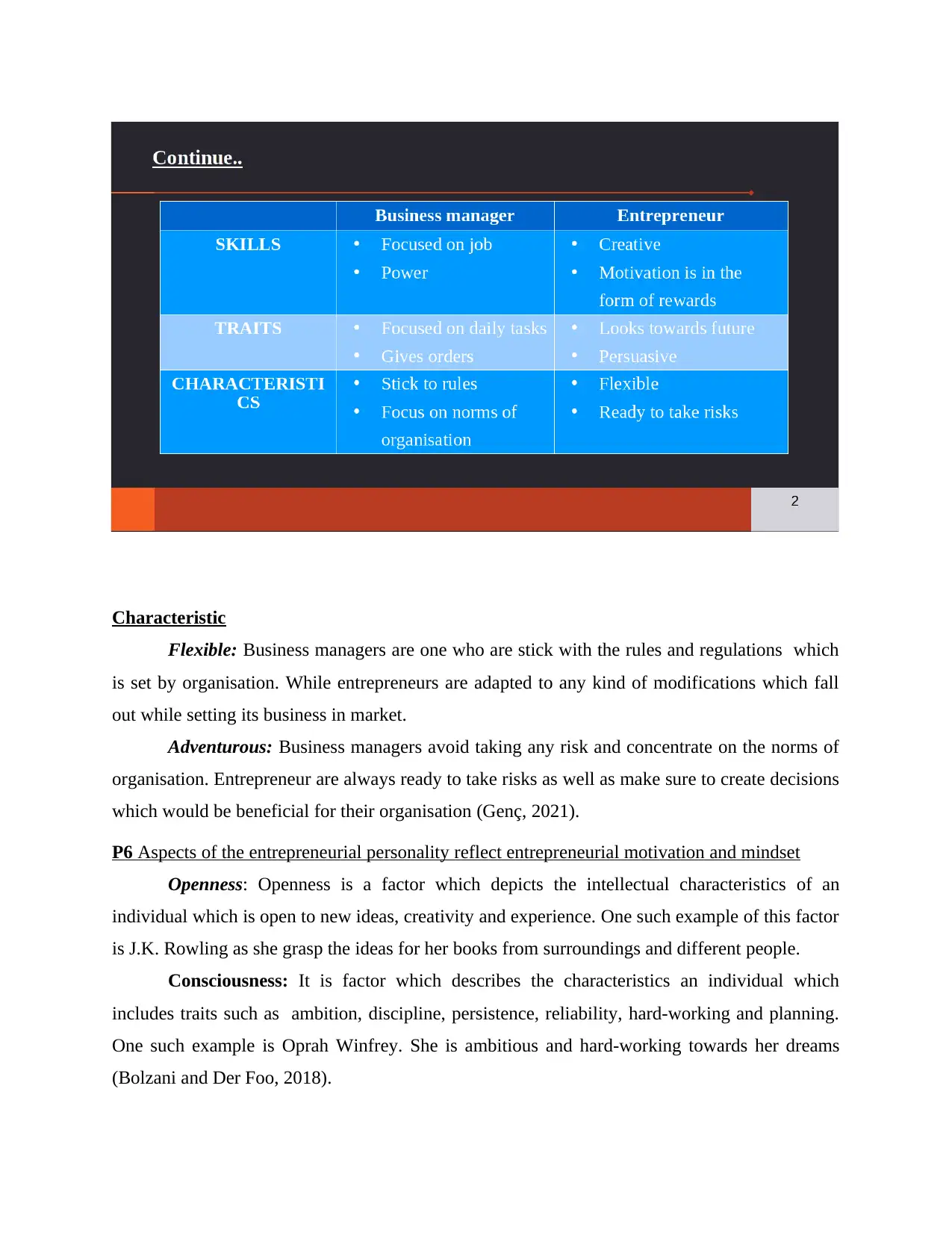
Characteristic
Flexible: Business managers are one who are stick with the rules and regulations which
is set by organisation. While entrepreneurs are adapted to any kind of modifications which fall
out while setting its business in market.
Adventurous: Business managers avoid taking any risk and concentrate on the norms of
organisation. Entrepreneur are always ready to take risks as well as make sure to create decisions
which would be beneficial for their organisation (Genç, 2021).
P6 Aspects of the entrepreneurial personality reflect entrepreneurial motivation and mindset
Openness: Openness is a factor which depicts the intellectual characteristics of an
individual which is open to new ideas, creativity and experience. One such example of this factor
is J.K. Rowling as she grasp the ideas for her books from surroundings and different people.
Consciousness: It is factor which describes the characteristics an individual which
includes traits such as ambition, discipline, persistence, reliability, hard-working and planning.
One such example is Oprah Winfrey. She is ambitious and hard-working towards her dreams
(Bolzani and Der Foo, 2018).
Flexible: Business managers are one who are stick with the rules and regulations which
is set by organisation. While entrepreneurs are adapted to any kind of modifications which fall
out while setting its business in market.
Adventurous: Business managers avoid taking any risk and concentrate on the norms of
organisation. Entrepreneur are always ready to take risks as well as make sure to create decisions
which would be beneficial for their organisation (Genç, 2021).
P6 Aspects of the entrepreneurial personality reflect entrepreneurial motivation and mindset
Openness: Openness is a factor which depicts the intellectual characteristics of an
individual which is open to new ideas, creativity and experience. One such example of this factor
is J.K. Rowling as she grasp the ideas for her books from surroundings and different people.
Consciousness: It is factor which describes the characteristics an individual which
includes traits such as ambition, discipline, persistence, reliability, hard-working and planning.
One such example is Oprah Winfrey. She is ambitious and hard-working towards her dreams
(Bolzani and Der Foo, 2018).
⊘ This is a preview!⊘
Do you want full access?
Subscribe today to unlock all pages.

Trusted by 1+ million students worldwide
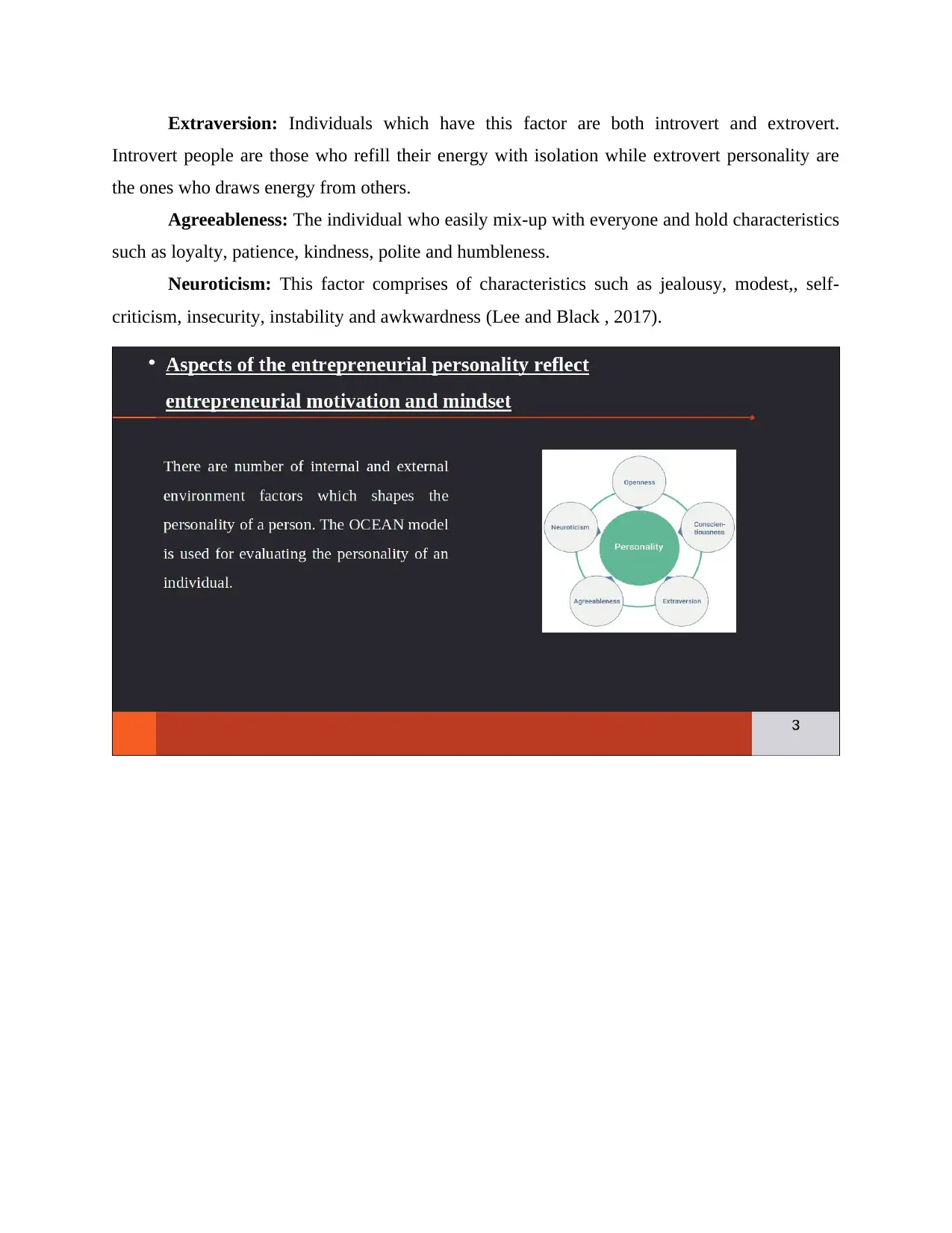
Extraversion: Individuals which have this factor are both introvert and extrovert.
Introvert people are those who refill their energy with isolation while extrovert personality are
the ones who draws energy from others.
Agreeableness: The individual who easily mix-up with everyone and hold characteristics
such as loyalty, patience, kindness, polite and humbleness.
Neuroticism: This factor comprises of characteristics such as jealousy, modest,, self-
criticism, insecurity, instability and awkwardness (Lee and Black , 2017).
Introvert people are those who refill their energy with isolation while extrovert personality are
the ones who draws energy from others.
Agreeableness: The individual who easily mix-up with everyone and hold characteristics
such as loyalty, patience, kindness, polite and humbleness.
Neuroticism: This factor comprises of characteristics such as jealousy, modest,, self-
criticism, insecurity, instability and awkwardness (Lee and Black , 2017).
Paraphrase This Document
Need a fresh take? Get an instant paraphrase of this document with our AI Paraphraser

P7 How background and experience can hinder or foster entrepreneurship
J.K. Rowling
J.K. Rowling

Background: Joanne Kathleen Rowling was born on 31st July, 1965 at Yate General
Hospital near Bristol. She has studied at St. Michael's Primary School in Gloucestershire prior
shifting to Chepstow, South Wales. She has accomplished her graduation from University of
Exeter and moved to Portugal to teach English in 1990. She got married to Jorge Arantes and in
1993, their daughter was born. After her divorce, J.K. Rowling and her daughter moved to
Edinburgh (J.K. Rowling. 2016)
Experience: She has a dream to become a writer and wrote her first book which is called
'Rabbit' as a kid when she was 6, which was about a rabbit. She wrote her first novel when she
was 11 years old . Oprah Winfrey herself wrote her first book “Harry Potter” when she was
struggling to raise her daughter. In 1990, when she was travelling from Manchester to London on
a train,she got this idea about the book. Her first book “Harry Potter and the Philosopher's Stone”
got published in 1998, by Scholastic in the US after facing many rejections. This book was
published with a different title which is called “ Harry Potter and the Sorcerer's Stone”. Warner
Bros. in 2001, produce film adaption of her first book and was preceded by six more adaption of
her books. She has even received many awards and honours including Companion of Honour,
for Service to literature and philanthropy in 2017, Blue Peter Gold Badge in 2007, Children's
Book of the Year, British Book Award in 1998 and 1999, WH Smith Fiction Award in 2004 and
many more (J.K. Rowling. 2016).
Hospital near Bristol. She has studied at St. Michael's Primary School in Gloucestershire prior
shifting to Chepstow, South Wales. She has accomplished her graduation from University of
Exeter and moved to Portugal to teach English in 1990. She got married to Jorge Arantes and in
1993, their daughter was born. After her divorce, J.K. Rowling and her daughter moved to
Edinburgh (J.K. Rowling. 2016)
Experience: She has a dream to become a writer and wrote her first book which is called
'Rabbit' as a kid when she was 6, which was about a rabbit. She wrote her first novel when she
was 11 years old . Oprah Winfrey herself wrote her first book “Harry Potter” when she was
struggling to raise her daughter. In 1990, when she was travelling from Manchester to London on
a train,she got this idea about the book. Her first book “Harry Potter and the Philosopher's Stone”
got published in 1998, by Scholastic in the US after facing many rejections. This book was
published with a different title which is called “ Harry Potter and the Sorcerer's Stone”. Warner
Bros. in 2001, produce film adaption of her first book and was preceded by six more adaption of
her books. She has even received many awards and honours including Companion of Honour,
for Service to literature and philanthropy in 2017, Blue Peter Gold Badge in 2007, Children's
Book of the Year, British Book Award in 1998 and 1999, WH Smith Fiction Award in 2004 and
many more (J.K. Rowling. 2016).
⊘ This is a preview!⊘
Do you want full access?
Subscribe today to unlock all pages.

Trusted by 1+ million students worldwide
1 out of 17
Related Documents
Your All-in-One AI-Powered Toolkit for Academic Success.
+13062052269
info@desklib.com
Available 24*7 on WhatsApp / Email
![[object Object]](/_next/static/media/star-bottom.7253800d.svg)
Unlock your academic potential
Copyright © 2020–2026 A2Z Services. All Rights Reserved. Developed and managed by ZUCOL.





